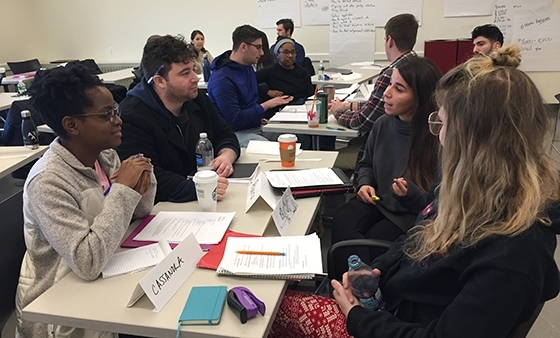
It’s been two years, but Tina Kassangana '19 remembers that first day very well. “Going in, I had no idea what to expect from a one-week class on negotiation—I don’t think any of us really did,” she says about Lawyering, the January intersession course that’s part of the required 1L curriculum. It ended up being a transformative experience.
“There’s a certain professionalism in knowing how to approach a negotiation, in knowing how to react to someone across the table when you don’t know what they’re going to say or do,” says Kassangana. “Lawyering teaches you how to do that, all while encouraging you to play to your personal strengths.” This year, Kassangana returned to the Lawyering classroom as one of 21 teaching assistants (TAs) who helped the first-year students optimize their learning experience.
Spearheaded by Professor Elayne E. Greenberg, assistant dean for dispute resolution programs, professor of legal practice, and director of the Hugh L. Carey Center for Dispute Resolution, Lawyering focuses on negotiation skills and the companion skills of interviewing clients and drafting agreements—core competencies for lawyers. “As an innovator in legal education, St. John’s understands that law students need to be introduced to both substantive law and legal skills beginning in their first year of law school,” Professor Greenberg says. “This helps students develop a more realistic idea of how lawyers practice in the real world. Having this dual skillset also makes St. John’s first-year students more competitive applicants for desirable legal positions from their first year summer positions and onward.”
The full-time and adjunct faculty members who teach Lawyering bring a range of expertise and practical insight to the classroom. Each year, the dedicated faculty collaborate to refine the course curriculum to meet the needs of the students and the changing contours of the profession. In addition to Professor Greenberg, this year’s faculty included:
- Peter Jay Bernbaum
- Elaine M. Chiu
- Dennis Glazer
- Ann L. Goldweber
- Michael Kerman
- Patricia Grande Montana
- Andrew J. Simons
- Rachel H. Smith
- Ettie Ward
With their professor’s guidance, and with support from the TAs, the 1L students apply the legal knowledge and analytical reasoning skills they developed during their first semester at St. John’s Law to real-world situations. “The goal,” Professor Greenberg says, “is to give every student a basic grounding in the theory and practice behind fundamental skills that lawyers use. The course also prepares students for the more advanced skills training available through the Law School’s clinics, internships, externships, co-curricular activities, and other professional offerings.
Kassangana is quick to point out that she tapped skills she honed as a 1L in Lawyering to compete successfully at the prestigious Willem C. Vis International Commercial Arbitration Moot. Other TAs also praise the course for helping them excel outside the classroom.
“I’m not a huge fan of public speaking and I’m a little bit shy when I first meet people,” says Jennifer Delasco '20. “The partner and group exercises in Lawyering got me out of my comfort zone and trying something I’d never done before. Afterwards, I decided to participate in the 1L Negotiation Competition and in the Law School’s Dispute Resolution Society (DRS). This year, as a member of DRS, I competed in the ABA Negotiation Competition.”
Jacob Heric '20 used the skills he learned in Lawyering as a student advocate in the Domestic Violence clinic. “Through Lawyering, I learned to be aware of different cultures and different perspectives,” he says. “I also learned to ask questions instead of assuming I know the answers, and to take time to allow clients to express themselves so I can better understand their interests and needs. The skills taught in Lawyering aren’t only useful for negotiations and legal practice. Listening to the interests of others and finding creative solutions to disagreements are really life skills.”
Like Heric, TA Jared Fitzpatrick '20 says that the Lawyering course was instrumental to his success as a student clinician. “My team in the Consumer Justice for the Elderly: Litigation Clinic and I had the opportunity to take on a new client. Our first meeting with her would have been exponentially more difficult if we hadn’t learned about, and practiced, interviewing in Lawyering. Lawyering helped in teaching empathy, one of the most important interviewing skills.”
TAs similarly praised Lawyering for providing a foundation for success in their summer jobs. “Lawyering put me at an advantage going into my summer internship,” says Allyson Rivard '20. “I was able to implement interviewing skills almost immediately, and found myself being trusted with extra responsibilities very quickly.” Max Bartell '19 also put his Lawyering knowledge and skills to work. “As a summer associate this past summer, I participated in a mock deposition program with other summer associates,” he shares. “I’m confident that I wouldn’t have been as successful in the program as I was if I hadn’t undergone the basic training during my Lawyering class.”
As she reflects on her experience as a Lawyering student and TA, Christine Kowlessar '19 notes that the course provides knowledge that transcends the particulars of any given practice area, including insight into “the ethical contours of the field in relation to the rules of professional conduct, as well as recognizing how culture impacts certain issues.”
Justin Penchuk '20 agrees. “Lawyering gave me a look into what it's actually like to be a lawyer and to negotiate settlements and agreements. But, it also changed the way I interact with people on a daily basis—a change that I’m incredibly proud of. The skill of being compassionate and approachable, while still being interest and goal oriented, is something that I, my fellow Lawyering TAs and students at St. John’s Law, and every lawyer, can and should use at the negotiating table and beyond.”
